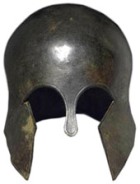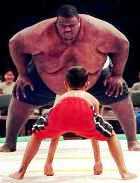Question for Bible study groups
- Who was the Bible’s most evil man?
- The Levite who abandoned his concubine to her horrific death?

- Goliath, the bullying giant who taunted young David?
- The evil Serpent who tempted Eve?
- The cruel Pharaoh of Egypt?
- Nebuchadnezzar, king of Babylon?
- Or was it a woman, bad-to-the-bone Jezebel?
The Levite who abandoned his concubine
Horrible stories in the Book of Judges
This is no light-hearted story with goodies and baddies. It is one of the most horrible stories in the Book of Judges (a Book not short on violence).
It concerns a Levite and the young woman who was his concubine – a sort of second-class wife. She became angry about something he did – we are not told what it was, but she left him to return to her father.
 He wanted her back, and after a cooling-off period he followed her to her father’s house.
He wanted her back, and after a cooling-off period he followed her to her father’s house.
He and her father got on famously, but there is no mention of what she thought. Her father agreed she must return to her husband, and they set off to return home.
The tragedy unfolds
As night fell, they come to a town called Gibeah. The people of this village seemed strangely inhospitable, but eventually an old man spoke to them, warning them they must not spend the night in the town square. He invited them to his own house, where they ate and drank.
But while they are eating, a sinister group of people gathered outside and started beating on the door. They wanted the Levite, they shouted, so they could have sex with him.
The force of Evil takes control
The man who owned the house went out to them and begged them to leave, but they laughed at him and persisted. He tried to bargain, offering his own young daughter and the Levite’s concubine.
‘Here are my virgin daughter and the concubine; let me give them to you now. Ravish them and do whatever you want to them…’ (Judges 19:24)
In the tussle that followed, the cowardly Levite pushed his concubine, whose name we never know, out into the group of men, who raped and abused her all night. It is a dreadful story.
 Eventually as morning broke she escaped and got back to the house, where she fell on the doorstep.
Eventually as morning broke she escaped and got back to the house, where she fell on the doorstep.
- Did she make a sound?
- Did she call for help?
The people inside, including her husband, did not open the door.
In the morning…
But eventually her husband got up and went outside, where he saw her with her hands clutching at the doorstep. ‘Get up’ he said. ‘We are going’.
There was no answer. Was she dead, or dying, or unconscious? The text does not say. The husband put her up over the donkey and then set out to continue his journey.
When he got home, he took a knife and cuts her into twelve separate pieces, limb by limb. Outraged by what had happened, he sent the twelve pieces, one to each of the twelve tribes of Israel.
No comment.
Goliath the Giant
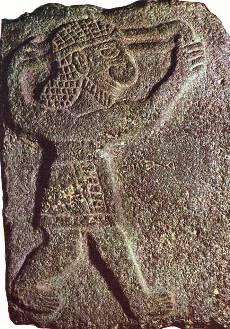
Ancient stone carving of a ‘slinger’ with his slingshot
Who was Goliath?
Goliath was the fearsome Philistine giant who confronted the Israelite army and mocked it. ‘Come out and fight, if you dare’, he challenged them.
To a man they were reluctant to accept the dare – hardly surprising, since according to the Bible he was over 9 feet tall, and built like a tank.
He also had some very fine armour and weapons –
- a bronze coat of mail,
- bronze greaves,
- bronze javelin,
- a spear with an iron spearhead,
- and a huge and terrifying sword.
He must have looked invincible.
Of course, he embodied everything the Israelites feared whenever they confronted the Philistines, who were technologically more advanced than they were, more numerous, and better trained.
The Philistine army could, it seemed, make mincemeat of the Israelites any time they liked. See War in the Bible
How could little David hope to beat Goliath? That was the question.
David’s response was a brilliant piece of lateral thinking:
Don’t fight them on their own terms, but on yours. Use what you are good at – in David’s case, he was an expert in the rather primitive weapon, the slingshot, and so he used that rather than face Goliath with a sword (see Swords in ancient warfare).
He succeeded, and used Goliath’s own sword to hack of the giant’s head.
This, of course, was a significant lesson to the Israelites, who were good at guerrilla warfare rather than open battle.
The message of the story? Make sure you are the one who chooses the weapons.
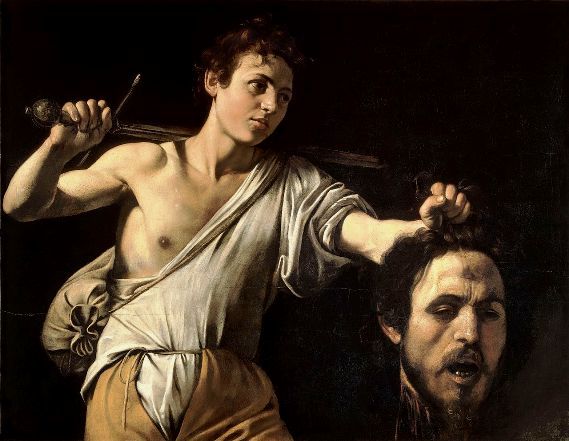
David and Goliath, by Caravaggio; see the bruise on Goliath’s forehead where the stone from the sling struck
‘Then David ran and stood over the Philistine; he grasped his sword, drew it out of its sheath, and killed him; then he cut off his head with it.’ (1 Samuel 17:51)
The Serpent in the Garden of Eden

‘Now the serpent was more crafty than any other wild animal
that the Lord God had made.’
Adam and Eve had a perfect world, but everything went wrong when they met the serpent.
The serpent was the worm in the apple. He spoiled it all, forever, for all of us.
It spoke to Eve, telling her God had duped her.
What did the serpent say to Eve?
Something was being deliberately hidden from her, it said, and she had only to eat the fruit to know as much as God did.
Eve was naive. She had no experience of deceit. She believed the serpent, and she ate the apple.
Actually it was a pomegranate she ate – there were no apples in the ancient Middle East.
What’s so dreadful about eating an apple?
The apple/pomegranate, with its multiple seeds (see image above) was an ancient symbol of fertility. It was linked to the agricultural religions in the ancient world. Worship of the agricultural gods was absolutely forbidden by Judaism. See Gods and goddesses in the ancient world.
After Eve had bitten into the apple she took the fruit to Adam, and he ate too. This is code for saying that both of them took part in rites belonging to fertility religions.
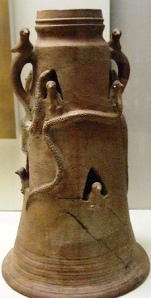
Offering vase covered in snakes, from the ancient Canaanite city of Beth-Shean in northern Israel
What happened after Adam bit into the apple?
- suddenly the world grew dark
- food was no longer abundant
- humans had to work if they wanted to eat – labouring in the fields until they dropped with exhaustion
- pain and disease appeared
- peace between humanity and nature was disrupted
The Garden of Eden was lost.
But why is evil shown as a serpent/snake?
Snakes of course can be poisonous, dangerous – but there are lots of other creatures who can harm us. Why choose a snake?
If you’d been an ancient Israelite, you’d have known the answer. The snake was important in the ancient fertility religions, which the Bible writers hated.
Phallic in shape and shedding its skin each year, the snake represented the implacable cycle of Nature, with
- life (spring and summer) followed by
- unavoidable death (autumn and winter).
The Pharaoh of Egypt
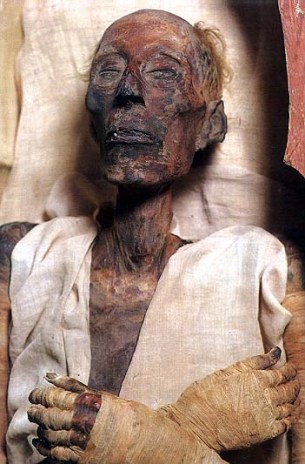
The unwrapped mummy of
the Egyptian Pharaoh Ramasses
Why did the Israelites hate and fear Egypt?
Egypt was the natural enemy of the Israelites.
- it was a large and expanding empire
- it had better weapons and military organization
- its culture was sophisticated and seductive
- it was right on their doorstep, much too close for comfort
Pharaoh ruled the Egyptians, so he became the focus of Israelite fear and loathing.
Pharaoh and Moses
The most famous Pharaoh was the one whom Moses confronted. This Pharaoh, possibly Ramses II (see above), was forced to let the great Israelite leader Moses lead the Israelites out of Egypt, and in the Bible story Pharaoh died by drowning in the Sea of Reeds.
The history behind this is much debated, but it is safe to say that the personality of Ramses II fits the picture of a ruler who would brook no disobedience.
 Egypt was Sin City
Egypt was Sin City
The Israelites saw Egypt as a sink of iniquity.
- The spoiled, beautiful wife of Potiphar who tries to seduce Joseph, is Egyptian, and a sophisticated one at that.
- Hagar who bears a child to Abraham is Egyptian. For the stories of these two women, see Bible women.
- In the Book of Genesis Joseph’s brothers decide to murder him, but one of them suggests that they sell him to slave dealers instead – dealers who are headed for Egypt. The message in this story is clear: bondage in Egypt is only one step up from death.
The story of the Hebrew’s enslavement in Egypt and eventual escape is one of the pivotal themes in the Bible. It has shaped Judaism ever since.
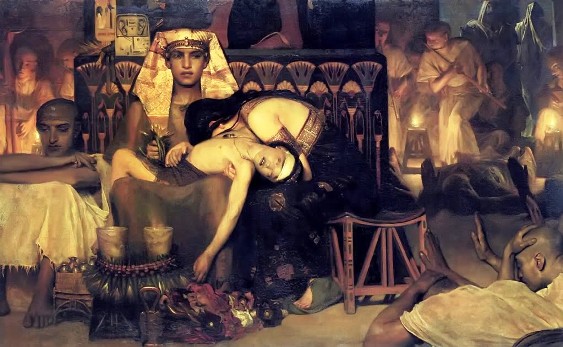
Lawrence Alma Tadema, Death of the Pharaoh’s firstborn son
‘At midnight the Lord struck down all the firstborn in the land of Egypt, from the firstborn of Pharaoh who sat on his throne to the firstborn of the prisoner who was in the dungeon. There was a loud cry in Egypt, for there was not a house without someone dead.’ (Exodus 12:29)
Nebuchadnezzar
Who was Nebuchadnezzar?
He was the King of Babylon, and Babylon as far as the Israelites were concerned was a sink of iniquity.
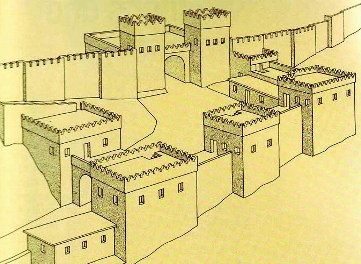
Reconstruction of the walls and gate of the ancient city of Megiddo; the walls around Jerusalem were probably similar, but larger
The word ‘Babylon’ became code for depravity, cruelty and paganism – everything bad.
Nebuchadnezzar ruled the Babylonian Empire from 605-562BC.
- he was an energetic conqueror, expanding his empire so that it extended from Egypt in the west to Elam in the east
- he rebuilt temples
- threw up immense fortifications around his cities, and
- erected palatial public buildings
Why is Nebuchadnezzar mentioned in the Bible?
He is mentioned because
- he met and terrified King Jehoiakim of Judah, who paid tribute to him and thereby acknowledged him as Judah’s master
- he destroyed Jerusalem and its Temple
- he sent the Jewish people into exile in Babylon.
Nebuchadnezzar’s resources were immense, and little Judah stood no chance against him.
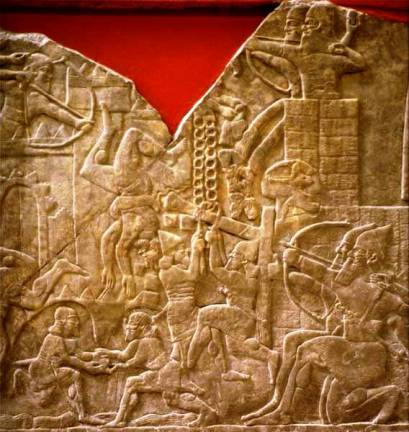
Wall engraving showing tactics used during a siege; notice the sappers (bottom left) undermining the walls of the city
Given Nebuchadnezzar’s power, you’d think Jehoiakim would have given in and paid tribute throughout his reign. Not so. He wanted to choose his overlord, and he chose to ally himself with Egypt instead – it was nearer, and less brutal than Babylon.
What did Nebuchadnezzar do?
Nebuchadnezzar responded quickly. He marched against Judah and laid siege to Jerusalem. The city fell. Jehoiakim survived, just, but was replaced by his uncle Zedekiah.
Incredibly, Zedekiah rebelled in turn – which sounds like a crazy thing to do, so perhaps the terms of surrender were too dreadful for the Jewish people to accept.
Jerusalem destroyed, its people exiled
For a second time Nebuchadnezzar marched against Judah, laid siege to the city for a year and a half, then conquered it.
This time he took no chances:
- he destroyed the Temple in Jerusalem and
- laid waste to the city and surrounding countryside, and
- exiled most of Judah’s population, including all its leaders, to Babylon.
Judah became a province of Babylon.
The exiles wept ‘by the rivers of Babylon’.

‘In the third year of the reign of King Jehoiakim of Judah, King Nebuchadnezzar of Babylon came to Jerusalem and besieged it……’ (1 Daniel 1.1)
And a woman – Jezebel
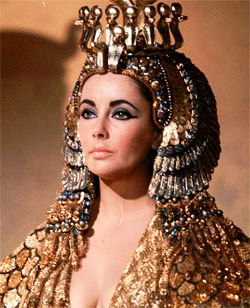
Women used to be called ‘Jezebels’ if they wore make-up. It was the sign of a whore. But Queens in the ancient world wore ritual clothing and make-up as part of their public display
Jezebel was very grand indeed. She was a princess and an aristocrat, daughter of the King of Sidon, a rich and sophisticated port-city on the Mediterranean coast. It was a triumph for King Omri of Israel when he successfully negotiated to get her as a bride for his son Ahab.
But she was trouble, no doubt of that.
Her name means ‘my prince is Baal’, and she was devoted to the Canaanite gods of water and fertility. She brought her fervent beliefs with her when she came to Israel. She also brought
- a rich retinue of servants
- including priests of Baal and
- the fertile Mount Carmel area as her dowry.
Ahab’s marriage to her was good for Israel, politically and economically. It also make life easier for Israelites who worshipped the fertility gods – a large proportion of the common people (see What did the Israelites believe?).
These gods were embodiments of the forces of Nature, and do were popular with people living off the land – at least 80% of the population. The northern province of Israel was a food bowl for Judah-Israel.
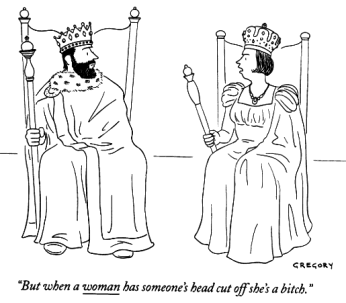 Jezebel’s political power was enormous, partly due to her status but also to her strong personality. She clashed with the priests of Yahweh during the years of a terrible drought that afflicted Israel, and the result seems to have been a draw.
Jezebel’s political power was enormous, partly due to her status but also to her strong personality. She clashed with the priests of Yahweh during the years of a terrible drought that afflicted Israel, and the result seems to have been a draw.
Jezebel gets rid of Naboth
She had no patience with the outmoded traditions of the Israelites, and when one of them, Naboth, flouted her husband, she simply did what any monarch in the surrounding countries would have done – she had him killed.
Her planning of this affair shows her legal knowledge, her manipulative skill and her ruthless determination.
When Ahab was killed in battle and her son succeeded to the throne, she became ‘Gebira‘, the Queen Mother, most powerful woman in the kingdom – certainly more powerful than the women in her son’s harem.
Jezebel is attacked and murdered
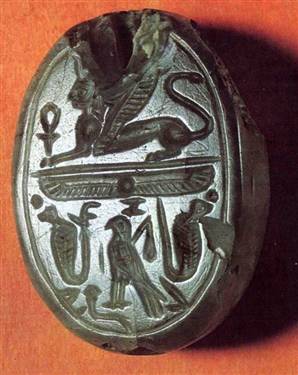
An ancient seal, said to have been
the seal of Jezebel
But an army captain called Jehu led a coup against her son and murdered him.
Jezebel herself was the next target. In the aftermath, Jezebel went down fighting: she put on the ritual make-up and crown of a queen on her head and hurled insults at Jehu, even as she was being murdered.
‘When Jehu came to Jezreel, Jezebel heard of it; she painted her eyes and adorned her head, and looked out of the window. As Jehu entered the gate, she said “Is it peace, Zimri, murderer of your master?” He looked up to the window and said “Who is on my side? Who?” Two or three eunuchs looked out at him. He said “Throw her down.” So they threw her down; some of her blood spattered on the wall and on the horses, which trampled on her.’ (2 Kings 9:30-33)
Later generations have linked Jezebel with whorish behavior, but it is hard to know why. She was fiercely faithful to her husband and family.
For Jezebel’s story, see Bible Women: Jezebel
Search Box
![]()
Bible Villains: the Pharaoh of Egypt, Goliath, the Levite who abandoned his concubine, the Serpent in the Garden of Eden, the tyrant Nebuchadnezzar
© Copyright 2006
Elizabeth Fletcher


